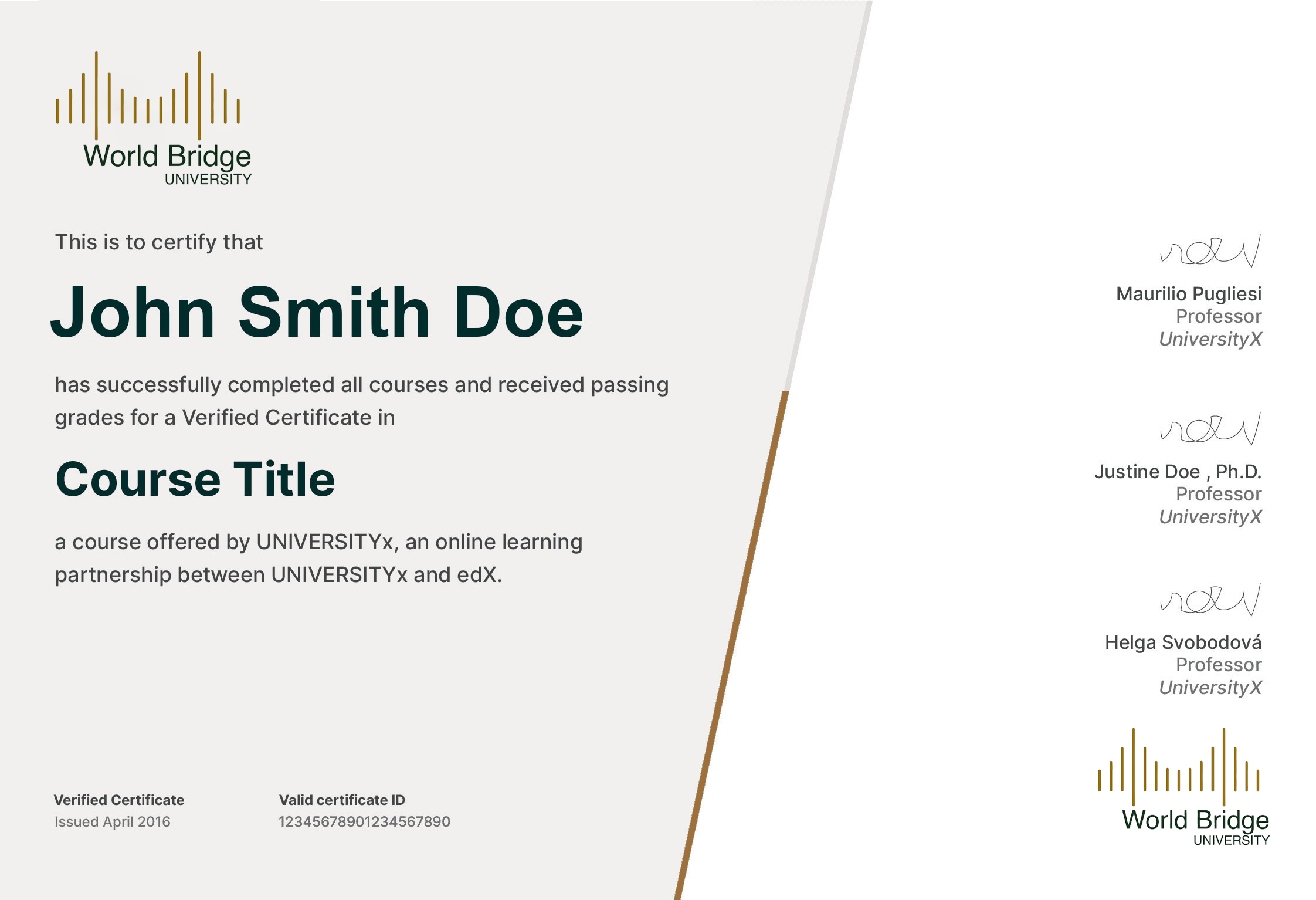Special Executive Masters Programme in International Business Law
Duration
6 Months
Pedagogy
Online
Instalment
₦ 165,115 /month interest-free*
Total tuition
₦ 2,201,535
About the course
Course OverviewThis comprehensive training seminar empowers participants to anticipate and get ready for critical situations while leading teams through uncertain times. It involves a deep understanding of the dynamics of business and global affairs, as well as the intricacies of interpersonal connections. The training provides learners with the necessary tools and expertise to decipher situational determinants and anticipate probable outcomes.
The training encompasses various elements, including forecasting, scenario-based prediction, situation analysis, complex problem-solving, planning methodologies, communication strategies, and psychological aspects like emotional intelligence and interpersonal perception.
The training program places its emphasis on four primary domains:
1. Preparation and Prediction Before a Crisis
2. Crisis Planning Beforehand
3. Leadership Strategies During a Crisis
4. Crisis Communication in the Midst of or Following a Crisis
Throughout the program, numerous case studies and real-world examples drawn from various companies and organizations will be utilized to illustrate the application of acquired tools and skills within crisis contexts.
Course details
About the Special Executive Masters ProgrammeThe Special Executive Masters Programme is a brief certificate training/seminar tailored for individuals seeking a more profound understanding of business concepts within a condensed and rigorous framework. This program caters to accomplished professionals or specialists in various sectors, including private, public, and nonprofit, who are assuming new management roles and require a swift expansion of their managerial expertise.
The (SEMP) Programme serves as a refresher for those who obtained their Master's Degree some time ago and need a quick knowledge update. Additionally, it functions as an intensive program for seasoned professionals who never found the time for a master's degree but seek the academic and practical benefits of such an experience. It particularly benefits individuals recently promoted to managerial positions, aiding their transition and decision-making acumen.
Objectives
Upon completion of this course, participants will achieve the following:
- Anticipate and strategize for crisis scenarios.
- Effectively communicate during crisis situations to ensure agile team responsiveness.
- Analyze complex situations and comprehend intricate issues and challenges.
- Acquire tools and skills for making complex decisions.
- Utilize planning and forecasting techniques to prepare for crisis management.
- Recognize the significance of personality traits and interpersonal dynamics in crisis leadership.
- Develop strategies for navigating uncertain situations and contingencies.
Who should attend?
This program is ideal for:
- Leaders responsible for managing teams in uncertain and evolving environments.
- Executives and Managers from diverse disciplines seeking insights into the latest integrated planning and situation forecasting techniques.
- Situational planners and analysts.
- Team and line managers.
- Entrepreneurs launching new products or pursuing innovative business ideas.
Modules
Day 1: Predicting and Managing Crisis Situations
- Engaging in scenario simulations and exercises.
- Connecting relevant data points to predict potential crises.
- Implementing preventive measures for unfavorable situations.
- Drawing lessons from past experiences.
- Preparing teams and executing crisis response plans.
- Creating protocols and establishing communication procedures during crises.
Day 2: Mastery of Crisis Communication
- Grasping the essentials of effective crisis communication.
- Identifying and overcoming communication barriers.
- Establishing communication channels primed for crisis situations.
- Defining and recognizing crisis-related roles.
- Avoiding common communication pitfalls and traps.
Day 3: Crisis Response Planning
- Understanding the content, significance, and applicability of a crisis plan.
- Communicating and resourcing the crisis plan effectively.
- Formalizing protocols for crisis plan execution.
- Utilizing planning tools and models.
Day 4: Crisis Management and Leadership Strategies
- Implementing management strategies tailored for crisis situations and uncertainty.
- Mobilizing teams swiftly through transformational leadership.
- Leveraging charisma to enhance commitment.
- Ensuring team "buy-in" during evolving scenarios.
- Facilitating problem-solving and delegation.
- Employing information management systems and technology for crisis analysis and decision-making.
Day 5: Situation Analysis, Forecasting, and Problem Solving
- Utilizing a range of tools, models, and techniques for complex problem-solving.
- Cultivating creative and critical thinking skills and employing associated tools.
- Applying quantitative and qualitative analysis techniques and tools.
Module: ASSIGNMENT & STUDY GUIDELINES
Lecture: 5
This module provides the most critical information about the study course and assignment submission.
-
VIDEO - How to Avoid Plagiarism in Your Writing
-
Harvard Referencing Style Guide
-
How to Summarise - Assignment Guide
-
Summarising, Paraphrasing, Quotation for your Assignment
-
Official Student Declaration Pages
Module: Legal Research Methods
Lecture: 14
Quiz: 1
The aim of this unit is to enable learners to cultivate essential knowledge, comprehension, and proficiency in legal research, along with the theoretical and methodological challenges linked to legal studies. Learners will have the opportunity to explore fundamental subjects related to research inquiries, perform comprehensive literature reviews, address referencing, employ data gathering and analysis methodologies, and formulate conclusions based on the scrutinized data.
-
Research Philosophies and Principles
-
VIDEO - Overview of the Research Onion
-
Selecting a Research Topic
-
Searching and Reviewing Literature
-
VIDEO - How to write a Literature Review
-
Developing conceptual Framework
-
PDF - How to create a Conceptual Framework
-
Research Strategy and Design
-
Research Methods I
-
Research Methods II
-
PDF - How Observation is Used As a Research Method
-
Research Methods: Data Analysis
-
Research Proposal and Writing Up
-
Research Ethics
-
QUIZ - Advanced Business Research Methods
Module: Company Law
Lecture: 2
Quiz: 1
The objective of this unit is to furnish learners with comprehensive insights into English Law concerning registered companies, encompassing both private and public limited entities. Throughout this module, learners will acquire a profound comprehension of the legal intricacies impacting companies. Additionally, they will delve into the rights and responsibilities inherent to shareholders and directors, along with the legal protocols surrounding corporate liquidation processes.
-
English Company Law: Duties, Rights, And Liquidation
-
English Company Law: Concepts and Procedures
-
QUIZ - Company Law
Module: Commercial Trust Law
Lecture: 2
Quiz: 1
This unit explores the law of trusts in an international context, comparing doctrine in different jurisdictions and exploring the theoretical implications of such differences.
-
Understanding the impact of commercialization of trust
-
Trust and Equity Governed by English Law
-
QUIZ - Commercial Trust Law
Module: International Trade Law
Lecture: 3
Quiz: 1
The objective of this unit is to enhance learners' comprehension of global trade legislation. Learners will delve into topics such as global competition regulations, as well as the principles and execution of international sales agreements, while critically assessing challenges related to conducting global business.
-
International Sales Of Goods: Governed By English Law
-
The Legal Landscape Of International Trade
-
The Legal Landscape Of International Sales Contracts
-
QUIZ - International Trade Law
Module: Industrial And Intellectual Property Law
Lecture: 3
Quiz: 1
The objective of this unit is to empower learners with the knowledge of regulatory and legislative demands in the realm of industrial and intellectual property laws. Within this context, learners will explore pertinent topics such as financial strategy, the management of debt and equity, the fundamental factors influencing shareholder value, principles of corporate governance, and strategies for managing asset portfolios.
-
Concepts and Effects of Intellectual Property Law
-
National And International Landscapes Of Intellectual Property Law
-
Remedies For Intellectual Property Infringement
-
QUIZ - Industrial and Intellectual Property Law
Module: Law And Financial Crimes
Lecture: 3
Quiz: 1
The Law and Financial Crimes course offers an insight into the legalities and regulations concerning financial misconduct. Throughout this course, students will delve into the legal structure that governs financial offenses, along with the methodologies and approaches employed for their detection and subsequent legal actions. Subjects encompass the contributions of financial establishments in thwarting such crimes, the application of technology in investigating financial wrongdoing, and the imperative global collaboration required to combat these illicit activities. Furthermore, participants will develop an appreciation for the ethical and occupational obligations of legal professionals engaged in cases related to financial misconduct.
-
Financial Crimes: Concepts Rules and Penalties
-
Money laundering Concepts Methods and Impacts
-
The Global Framework for the Fight Against Financial Crimes
-
QUIZ - Law and Financial Crimes
Accreditation
The content of this course has been independently certified as conforming to universally accepted Continuous Professional Development (CPD) guidelines.All of our courses are accredited by the relevant partners and awarding bodies. Please refer to our information in about us for more details.
Entry requirement
Academic prerequisites are not applicable to this program since it is a non-credit bearing course. Nevertheless, participants should possess practical experience in roles such as Team Lead, Supervisor, or Manager.Sample Certificate

Request follow-up
Fill in the form below and one of our student advisers will contact you soon.

How students similar to yourself are reaching their aspirations.
At World Bridge University, our students don’t just gain skills; they grow in empathy, connect across cultures, and shape a future grounded in inclusivity and collaboration.

Kim A.
Ghana
These short courses have been a game-changer for my career. The knowledge and skills I gained here helped me secure a promotion and a substantial pay raise. I'm grateful for the opportunity to learn from experts in the field.
Advanced Professional Certificate Courses

Hollie W.
Kenya
I can't recommend these courses enough! The content is well-structured, and the instructors are top-notch. I completed a course in project management, and it immediately boosted my confidence and job prospects.
Advanced Professional Certificate Courses

Omar A.
Pakistan
I was pleasantly surprised by how practical and hands-on the courses were. The skills I acquired here are directly applicable to my daily work, and I've become a more valuable asset to my company.
Professional Certificate Courses

Austin K.
Sweden
I initially had reservations about online learning, but these short courses completely changed my mind. The platform is user-friendly, and the support from the instructors is outstanding.
Professional Certificate Courses

Huzaifa A.
United Arab Emirates
These courses are a fantastic investment in your professional growth. The price is reasonable, and the knowledge gained is priceless. I now feel more confident and competitive in my industry.
Advanced Professional Certificate Courses

Jolene P.
United Kingdom
The selection of courses on this website is impressive. I've completed multiple courses, and they've all been incredibly enriching. I'm grateful for the opportunity to learn and grow.
Advanced Professional Certificate Courses
